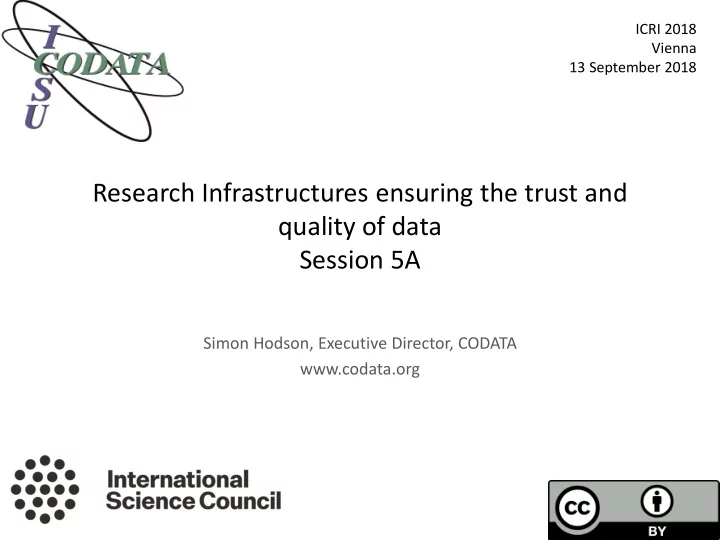

ICRI 2018 Vienna 13 September 2018 Research Infrastructures ensuring the trust and quality of data Session 5A Simon Hodson, Executive Director, CODATA www.codata.org
What contributes to quality and trust? What principles and practices are relevant to RIs with regard to trustworthiness and quality of data? Quality and trust relates to… The data as such Metadata and provenance Controlled vocabularies and ontologies Organisational standards, processes and sustainability FAIR principles help us a great deal in thinking about these issues and preparing policy FAIR needs to be supported by an ecosystem of policies, standards, services and robust organisations, including Research Infrastructures
The data as such… Scientific and (sometimes) operational questions Were the instruments calibrated properly, is the methodology robust, were the survey questions well designed…? The need to be able to assess data quality, to test reproducibility of a result is perhaps the most fundamental and imperative argument for Open Data and Open Science Need openness in hardware, in algorithms/code, in any software packages and tools, in steps throughout the chain of data capture, processing, reduction, preparation etc.
Metadata and provenance Thorough, quality and trustworthy metadata is essential for data discovery and reuse Completeness and quality of metadata can be more easily assessed and encouraged Various organisations have suggested minimal metadata standards across domains and in particular domain reporting Provenance metadata has a considerable bearing on the assessibility and reusability of the data Without robust provenance metadata we cannot be fully confident in the quality and trustworthiness of the data Need quality standards for metadata both in terms of standards established by particular disciplines and in terms of completeness
Controlled Vocabularies and Ontologies Very important for interoperability and reuse; essential for computational use at scale Operate at the datum level, i.e. of a particular measurement. Or at the level of defining features in images, terms in text etc. Do we or do we not have a shared, consistent and robust definition of what has been measured, observed, recorded and how? Uniform Description System for Materials at the Without the use of shared and well-defined Nanoscale: http://dx.doi.org/10.5281/zenodo.56720 vocabularies or ontologies, we cannot be fully confident in the quality and trustworthiness of the data The data may not be fully usable without these things so they are integral to the ‘quality’ of the data in that sense http://www.obofoundry.org/
Organisational Standards, Processes and Sustainability FAIR data depends on an ecosystem of organisations that provide identifiers, metadata standards, vocabularies and ontologies, that steward the data and provide useful tools, computational access to the data Important not to focus on ‘making data FAIR’ at the expense of maintaining about this ecosystem Data creation, processing, annotation, ingest, stewardship, quality metadata and semantics, providing human and computatational access: core roles for Ris and essential for quality and trustworthiness To do this, it is important to ensure the robustness of business processes for these things, significance of mission, value proposition and business model for sustainability etc. Quality and maturity standards exist for these things and should be explored, refined and adopted Business models for sustainable data repositories https://doi.org/10.1787/302b12bb-en
RIs and policy implications CoreTrustSeal https://www.coretrustseal.org/ RIs have a role in relation to all of these dimensions Policy Implications: policies should Support FAIR data as an important contributor to some of these components of quality Take steps to ensure the development, support and sustainability of the FAIR data ecosystem , particularly identifiers, metadata standards and Interim FAIR Data Report vocabularies / ontologies, trusted services https://doi.org/10.5281/zenodo.1285272 RIs and other institutions that steward data and provide computation access should look seriously at standards for organisational processes such as CoreTrustSeal, ISO 14721 and 16363; contribute to their further development and adoption OAIS Reference Model https://public.ccsds.org/pubs/650x0m2.pdf
Thank You for your attention European Commission Expert Group Interim Report on Making FAIR Data a Reality https://doi.org/10.5281/zenodo.1285272 ISC and CODATA Initiative on Data Interoperability and Integration for Interdisciplinary Research Programmes http://dataintegration.codata.org/ African Open Science Platform Strategy Document with some insights on coordinating Research Infrastructures for Open Science http://www.codata.org/strategic- initiatives/african-open-science and https://doi.org/10.5281/zenodo.1407488 International Data Week, comprising SciDataCon and the RDA 12 th Plenary Meeting, 5-8 November, Gaborone, Botswana: http://internationaldataweek.org/ simon@codata.org | www.codata.org | @simonhodson99
Recommend
More recommend